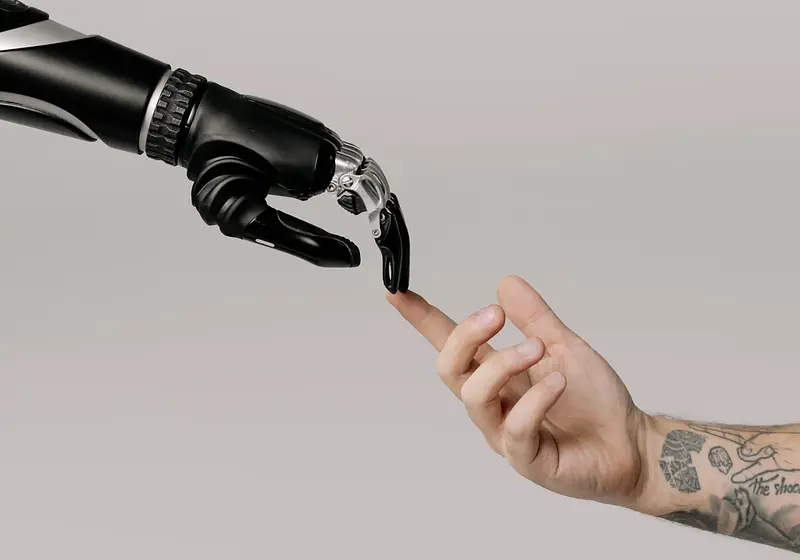If you are not a robot, how are you made?
The Creator, a new original science fiction film about artificially intelligent beings who coexist with humanity in a state of constant warfare, is directed by Gareth Edwards and is in theaters now. The film presents an interesting discussion about AI, its place in Hollywood and the moviemaking industry, and the philosophy of mechanized morality and intelligence.
Artificial Intelligence and Hollywood's Strikes
I hope I'm wrong, but I do think that the use of AI is going to take over the entertainment industry, and I think it's going to be really bad.
To assert that artificial intelligence is a hot topic this year is not a thesis that warrants much explanation - with the notable advent of ChatGPT, chatbot, and writer extraordinaire, the concept of machines that can replicate and surpass the workings of the human mind is far from revolutionary in the current climate. But the emergence of this software hasn't just been pervasive in education, which has already changed drastically in the era of essays being easily fabricated (a lot of handwritten papers these days, folks), as well as other adjustments.
One of the most interesting areas of development and controversy regarding artificial intelligence has been Hollywood and the movie industry as a whole, which has witnessed an outcry from actors and writers to studios during the recent SAG-AFTRA and WGA strikes.
Though the WGA recently reached a compromise with the AMPTP (Alliance of Motion Picture and Television Producers), their goals for the strike - alongside fair pay, job security, streaming residuals, and writer's room sizes - were to limit the use of artificial intelligence in the writing process, since studios had already made steps to implement ChatGPT to lower the costs of paying writers. The agreement reached is unknown, but consumers everywhere can breathe a sigh of relief that writers reached a level of negotiation with studios that they were content with. However, SAG remains on strike, a strike which was begun on account of artificial intelligence.
In addition to streaming residuals, SAG went on strike because of the scanning of actors' faces in order to implement their likeness in other projects using AI. Though it may sound like the plot of a dystopian fiction novel, this is an emerging practice in Hollywood, and actors are having to strike just because they don't want an AI duplicate of their face used in their place.
AI's History in Cinema
I'm sorry, Dave. I'm afraid I can't do that.
And studio manipulation of artificial intelligence should come as no surprise to anyone familiar with Hollywood's interest in technology like this. The first movie to feature a robot double was Metropolis, Fritz Lang's German expressionist silent film made back in 1927, and the first major Hollywood film, The Day the Earth Stood Still, made in 1951. Perhaps the most well-known example of a true artificial intelligence, one whose replications of the human mind were nothing short of revolutionary at the time, is HAL-9000 in Kubrick's 2001: A Space Odyssey.
HAL is Alexa, ChatGPT, and Ultron (do the kids know Ultron better than they know HAL? I wouldn't really know) all rolled into one: a malevolent supercomputer who is able to outthink the protagonists at every turn, cheerfully providing them with helpful labor until he provides the infamous line. Since then, Star Wars, Terminator, The Iron Giant, WALL-E, M3GAN, you name it - the sentient robot has become a staple of the movies.
But it's really in the philosophy of artificial intelligence that the topic becomes fascinating. One of the most nuanced pieces of cinema of the 2010s, Alex Garland's Ex Machina, won critical acclaim upon release for its thrilling exploration of an android named Ava, and her interactions with a man named Nathan in a laboratory setting. The Turing test conducted within the film, a Turing test is a test of whether one is able to distinguish a robot from a human, acts as a truly immersive and brilliant way of exploring the morality and philosophy associated with artificial intelligence.
Though venturing into spoilers would tarnish a film that approaches the status of masterpiece, the border between genuineness and fabrication, the line between emotion and programming, the division between a soul and a hunk of metal... these are all thoroughly blurred in Ex Machina. The film plays with the ambiguity of artificial intelligence in a way that approaches the works of Turing himself, immersing the audience in a set of ideas that grow increasingly significant by the day.
Where The Creator Falls Short
They're not people, Maya. It's just programming.
(spoilers for the first act of The Creator)
The latest movie in this saga of cinematic artificial intelligence is a film called The Creator, and it initially showed promise as a more mainstream rendition of the themes Ex Machina conveyed so beautifully. The trailer was everything you could want - a deep and perceptive two minutes of footage centering on a man grappling with the morality of killing machines. There was even a shot in the trailer that seemed incredibly indicative of profundity, a shot of a robot reaching out its hand in pain as it is crushed in a trash compactor, at once a metaphor for suppressing change and ignoring the pain of the oppressed.
But unfortunately, though crisp and well-assembled in so many ways, The Creator lacks the philosophical center that it purports to possess; it may be a well-oiled machine of a film, but it is not an insightful or sophisticated human being. The film's ethical explorations may as well be generated by ChatGPT itself: consistently devoid of substance, always asserting a vague precept without any real rhetoric, failing the Turing test by lacking original thought.
After the obligatory exposition, The Creator's first scene takes place after some of its most interesting plot points. American sergeant Joshua Taylor is undercover in New Asia, home of the last remaining Simulant (androids with AI) strongholds. He is married to a woman named Maya, rumored to be the architect behind New Asia's Simulants.
Despite living among them for years, Joshua has absolutely no moral qualms about destroying Simulants, and when his cover is blown, he is bafflingly certain that Maya will agree with him. To nobody's surprise but Joshua, she doesn't, and is assumed dead when American troops arrive to carry out their bombing. Five years later, Joshua is sent back to New Asia in order to find the Simulant weapon - a small child whose machinery is far more advanced than any other robot - and his heart begins to soften as the girl travels with him and voices her innocent desire for peace and freedom.
In short, The Creator refuses to inject ambiguity and nuance into its plot, resulting in an ethical dilemma that the entire world will be grappling with for decades basically being boiled down to the plot of Avatar: the bad guy changes his mind and protects the good guys from the bad guys at all costs. The way in which he changes his mind, by getting to know the Simulant girl - dubbed 'Alphie' - is actually a fairly heartwarming storyline. But the film manages to avoid any explanation or exploration as to whether the Simulants can count as real people, violently steering away from the hints of philosophy suggested by the trash compactor shot or the "it's just programming" line.
As far as I can tell, there is never any elaboration on how they aren't just programming. The audience is simply supposed to accept their virtue point blank, just as Joshua does within minutes, despite not having done so in the years he spent undercover.
But The Creator is Still Pretty Good
You have to be a good person to go to heaven.
Then we're the same. We can't go to heaven, because you're not good. And I'm not a person.
In the context of a discussion of the morality and ethics surrounding artificial intelligence, any review of The Creator will claim it falls short. But luckily, this is where the film's shortcomings stop, leaving a competent and highly enjoyable piece of original science fiction behind. It's really the relationship between Joshua and Alphie that drives the story forward and provides the movie with its distinct soul.
Alphie's personality, charmingly eccentric and massively powerful, is not an unfamiliar trope, but Madeleine Yuna Voyles' precious vulnerability and undeniably adorable mannerisms give life and meaning to the character. Voyles' chemistry with leading man John David Washington (BlacKkKlansman, Tenet) is both playful and urgent, with Washington's attachment to Alphie coming across as tangible and believable in spite of the poor writing. And speaking of writing, their dialogue is satisfying and well-executed enough to offset some of the more glaring issues with the plot and themes, making for a satisfying combo of charismatic acting, and characters that one cares about.
Furthermore, The Creator's visuals are incredibly notable, not just because of their sheer quality, but because of the budget they were made on. Though Gareth Edwards' direction is not superb, and he is overly fond of using the same "world goes silent post-explosion" sound effect multiple times in an hour of the film - at one point, twice in one scene - the director of photography he selected, Oren Soffer, executes Edwards' vision and excuses much of his shortcomings.
Even in times where boatloads of visual effects are employed, Soffer masterfully weaves an agro-futuristic setting together with bouts of hypermodern warfare, using incredible lighting techniques and character-based framing techniques. Most notably, however, are the visual effects themselves, which manage to be far more realistic than many big studio films in the past three years (think Ant-Man and the Wasp: Quantumania or The Flash) on an impressively minimal 80 million dollar budget.
Conclusion
The Creator is a successful sci-fi adventure, imbued with fantastic world-building, satisfying visuals, and two memorable lead performances. But that doesn't make Gareth Edwards' vision any less disappointing. It would have been so simple, and yet so significant, to orchestrate a successful piece of cinematic philosophy on the topic of artificial intelligence.
The material begs for substance to be added. The trailer even implies that the moral questions about Simulant status are central to the film... and yet, for whatever reason - perhaps running time issues, screenwriting failures, or a general sense of misguided enthusiasm about other, less fulfilling plotlines - these concepts are thrown by the wayside.
Any emphasis that these flaws are not the end-all be-all, and that The Creator still manages to be quite a good movie, is an assessment that ends up feeling hollow because of these failures. The 80 million dollar budget for visuals may prove to be the idea that impacts Hollywood the most, but then again, the film's recent box office failure makes any positive appraisal in Los Angeles look decidedly unlikely. Overall, The Creator is recommended for audiences who are looking for a serious and grounded science fiction tale, just maybe not those who want that tale to include pertinent themes.
It can only be called acceptable - or, if you're really generous, a solid first draft. And as for artificial intelligence as a whole? Well, for now, all this author can say is that this review was not written by ChatGPT.















.jpg)